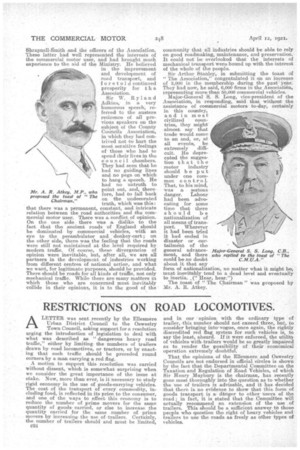Chairman." on the undecorated truth, which WW1 this: that there
Page 20

If you've noticed an error in this article please click here to report it so we can fix it.
was a permanent, constant, and intricate relation between the road authorities and the come mercial motor user. There was a conflict of opinion. On the one side there was a dislike to the fact that the ancient roads of England should be dominated by commercial vehicles, with an eye to the perambulator and donkey-cart; on the other side, there was the feeling that the roads were still not maintained at the level required by modern traffic. Of course, these divergencies of opinion were inevitable, but, after all, we are all partners in the development of industries working from different centres of national action, and what we want, for legitimate purposes, should be provided. There should be roads for all kinds of traffic, not only mechanical traffic. While there are many matters in which those who are concerned must inevitably collide in their opinions, it is to the good of the
community that all industries should be able to rely on good roadmaking, maintenance, and preservation.
that It could not be overlooked at t i
he nterests of mechanical transport were bound up with the interest of the whole of the people..
Sir Arthur Stanley, in submitting the toast of " The Association," congratulated it on an increase of 2,000 in the membership during the past year. They had now, he said, 6,000 firms in the Association, representing more than 50,000 eommercial vehicle's.
Major-General S. S. Long, vice-president of the Association, in responding, said that without the assistance of commercial motors to-day, certainly in this country, and in most civilized countries, they might
• almost. gay that trade would cometo 'an end, or, at all events, be extremely diffi cult. He deprecated the suggestion that the motor industry should be put
under one common control. That, to his mind, was a serious danger. Labour had been advocating for so-me time that there
should be nationalization of all means of transport. Wherever it had been. tried it had ended in disaster or curtailment Of the general advancement, and there could be no doubt about it that any form_ of nationalization, no matter what it might be, must inevitably tend to a dead level and eventually to inertia. (" Hear, hear.") ,
The toast of " Tile Chairman" was proposed by Mr. A. R. Atkey. Major-General S. S. Long, C.B., who replied to the toast of "The
































